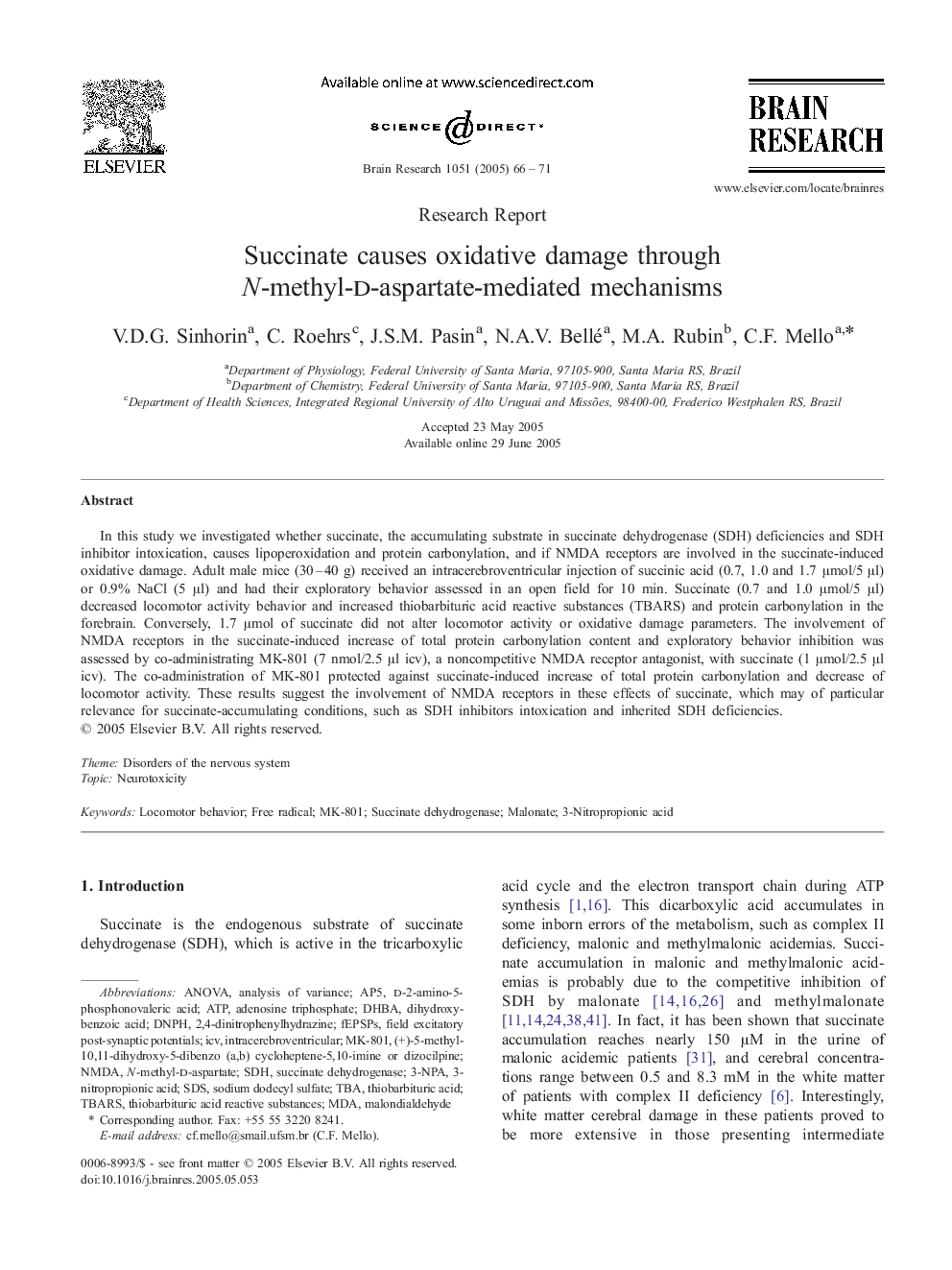| کد مقاله | کد نشریه | سال انتشار | مقاله انگلیسی | نسخه تمام متن |
|---|---|---|---|---|
| 9416052 | 1614329 | 2005 | 6 صفحه PDF | دانلود رایگان |
عنوان انگلیسی مقاله ISI
Succinate causes oxidative damage through N-methyl-d-aspartate-mediated mechanisms
دانلود مقاله + سفارش ترجمه
دانلود مقاله ISI انگلیسی
رایگان برای ایرانیان
کلمات کلیدی
DHBADNPHd-2-amino-5-phosphonovaleric acidICVintracerebroventricularMK-801AP52,4-dinitrophenylhydrazine - 2،4-dinitrophenylhydrazinefEPSPs - fEPSP هاAdenosine Triphosphate - آدنوزین تری فسفاتATP - آدنوزین تری فسفات یا ATPDisorders of the nervous system - اختلالات سیستم عصبیanalysis of variance - تحلیل واریانسANOVA - تحلیل واریانس Analysis of variancedihydroxybenzoic acid - دی هیدروکسی بنزوئیک اسیدNeurotoxicity - سمیت عصبیfield excitatory post-synaptic potentials - میدان های تحریک پذیر پس از سیناپسی
موضوعات مرتبط
علوم زیستی و بیوفناوری
علم عصب شناسی
علوم اعصاب (عمومی)
پیش نمایش صفحه اول مقاله

چکیده انگلیسی
In this study we investigated whether succinate, the accumulating substrate in succinate dehydrogenase (SDH) deficiencies and SDH inhibitor intoxication, causes lipoperoxidation and protein carbonylation, and if NMDA receptors are involved in the succinate-induced oxidative damage. Adult male mice (30-40 g) received an intracerebroventricular injection of succinic acid (0.7, 1.0 and 1.7 μmol/5 μl) or 0.9% NaCl (5 μl) and had their exploratory behavior assessed in an open field for 10 min. Succinate (0.7 and 1.0 μmol/5 μl) decreased locomotor activity behavior and increased thiobarbituric acid reactive substances (TBARS) and protein carbonylation in the forebrain. Conversely, 1.7 μmol of succinate did not alter locomotor activity or oxidative damage parameters. The involvement of NMDA receptors in the succinate-induced increase of total protein carbonylation content and exploratory behavior inhibition was assessed by co-administrating MK-801 (7 nmol/2.5 μl icv), a noncompetitive NMDA receptor antagonist, with succinate (1 μmol/2.5 μl icv). The co-administration of MK-801 protected against succinate-induced increase of total protein carbonylation and decrease of locomotor activity. These results suggest the involvement of NMDA receptors in these effects of succinate, which may of particular relevance for succinate-accumulating conditions, such as SDH inhibitors intoxication and inherited SDH deficiencies.
ناشر
Database: Elsevier - ScienceDirect (ساینس دایرکت)
Journal: Brain Research - Volume 1051, Issues 1â2, 27 July 2005, Pages 66-71
Journal: Brain Research - Volume 1051, Issues 1â2, 27 July 2005, Pages 66-71
نویسندگان
V.D.G. Sinhorin, C. Roehrs, J.S.M. Pasin, N.A.V. Bellé, M.A. Rubin, C.F. Mello,